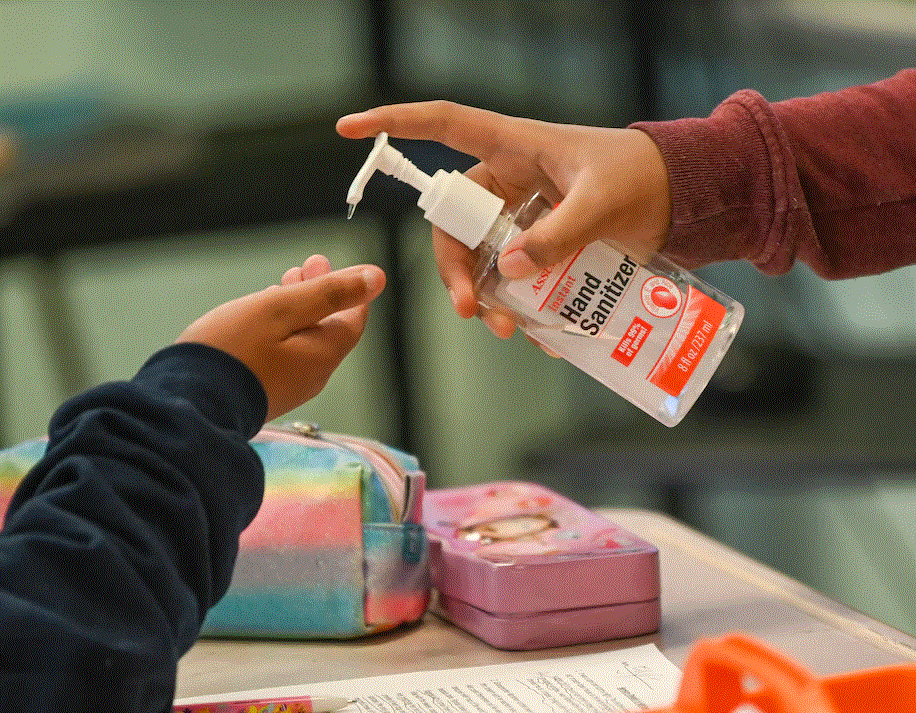
A student offers a squirt of hand sanitizer to another on Nov. 8 in Jaylin Ramsey's fourth grade class at Glenmount Elementary/Middle School in northeast Baltimore. (Jerry Jackson/The Baltimore Sun via Associated Press)
Fixing Baltimore’s schools: A model
Originally published in the Washington Post
Baltimore City’s public school system is clearly broken. But what would repairing and rebuilding education in the city look like?
To answer that question, I turned to Laura Hawkins, chief of strategic advancement and communications for New Schools for New Orleans, and Patrick J. Wolf, distinguished professor of education policy and 21st Century Endowed Chair in School Choice at the University of Arkansas College of Education and Health Professions. The focus was New Orleans-specific reforms that helped transform that district from one of the nation’s weakest to a stronger district composed almost entirely of charter schools. However, my conversation with Wolf also touched on lessons from Arizona, Florida and D.C., all three of which improved their performance on the nationwide National Assessment of Educational Progress exam after expanding educational freedom. The highlights of those conversations follow:
Devolve school governance. Hawkins observed that many decisions can best be made at the level of individual schools or smaller groups of schools, rather than systemwide.
Choose effective curriculums. Hawkins explained that “there’s almost a script” for successful teaching. A good curriculum includes scaffolding, showing a teacher how to modify lessons for students who are both more advanced and those who are behind. For the latter, it’s better not to pull them out of their regular classes for remediation. Instead, keep those students in class, “use scaffolding to learn grade level standards, and catch them up in that way.”
Expand choice and competition. New Orleans demonstrated that both choice and competition help students, especially students from disadvantaged backgrounds. Simply introducing competition can improve public schools, as they work harder to serve and retain their remaining students.
Toward that end, Wolf suggested that policymakers prioritize a private-school choice program. He pointed to Maryland’s over-enrolled, means-tested Broadening Options and Opportunities for Students Today program and advised increasing both the dollar amount and the number of available vouchers to increase participation.
Wolf further recommended expanding the number of quality charter schools in Baltimore City through deregulation. Given that demand exceeds supply for charters nationwide, this change could be consequential.
Offer parents programmatic support. School choice in New Orleans succeeded in part because of programmatic support. Expanded choice in Baltimore should be complemented by support for under-resourced families, who may be choosing their children’s schools for the first time. Wolf recommended education-oriented nonprofits and the school-choice guide site GreatSchools.org as parental resources. “Coaching, support groups, and infrastructure” can all fuel the overall success of a new school-choice program.
Welcome nontraditional teachers. Post-Katrina New Orleans illustrated the positive effect of enthusiastic, nontraditional teachers. Wolf noted that substantial research has found certification isn’t correlated with teacher efficacy. Passionate subject matter experts can excel in classrooms if the educational bureaucracy tolerates them. Wolf said that lawmakers could loosen personnel restrictions. Waivers for Baltimore City could allow noncertified or provisionally certified teachers, placing more high-quality teachers in Baltimore City classrooms.
Implement an accountability system. One change New Orleans adapted from Florida was school accountability. Wolf explained, “Schools are evaluated, rewarded, and punished based on the test score performance of their students.” This incentivizes school leadership to focus on student performance. (Citizens might inquire what the six employees in Baltimore City Public School’s Achievement and Accountability Office are doing, but it’s likely not this.)
End social promotion in third grade. Research shows “reading in third grade is the single most important predictor of students’ future academic performance,” because reading is “a gateway skill.” For that reason, Florida began to require reading proficiency before students can be promoted to fourth grade. This reform sets students up for success in later grades.
Spend wisely. D.C. has made significant progress during the young millennium. With “half of D.C. public school students in charter schools,” traditional public schools now educate fewer students. However, the “traditional system is pressured to use their extra resources effectively and responsibly because they need to demonstrate performance to hold onto their resources.”
If schools aren’t serving students, families deserve the freedom to leave for something they consider better. Educational bureaucracies may be forever, but childhood is fleeting.
Melissa Langsam Braunstein is a visiting fellow at the Maryland Public Policy Institute.






